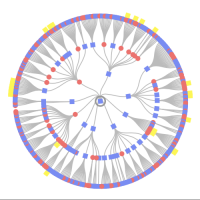Repeated Delete/Restore

Long ago I heard there might be a way to lock a person who had been repeatedly deleted and restored. It was explained that FS would see the number of switches and look at the sources offered for each then decide which was real and lock it into place so it couldn't be changed again. Is there anyway for this to be implemented?
Comments
-
@Marti Pike Thank you for your suggestion. Your idea has been forwarded to the appropriate Project Manager.
1 -
Given that only the person who enters a profile can delete it, and that only if nobody else has ever touched it, I'm not sure what you mean by "repeatedly deleted and restored".
1 -
See the Knowledge Article below.
0 -
I had the same experience. Recently, I put a note in the alert area of my ancestor for anyone making any additions or changes to join me on a conference call with FamilySearch.
1 -
Did you mean "repeatedly merged and restored"?
2 -
That works too. Anytime there is a change and restore over and over again.
0 -
There is a Knowledge Article at
https://www.familysearch.org/en/help/helpcenter/article/how-can-i-prevent-other-people-from-making-inaccurate-changes-to-family-tree titled "How can I prevent other people from making inaccurate changes to Family Tree?" Article Id: 1135 November 11, 2022
But it doesn't cover making a repeated "Restore" necessary.
0 -
Have you had any takers? Have you had anymore changes?
0 -
No takers and no changes additional changes.
Having incorrect people in my Family Tree resulted in my completing ordinances for people I was not related to when requesting ordinances from “Ordinances Ready”.
1 -
If FamilySearch finds a person misusing Family Tree, they have the option of baring the patron from using Family Tree for a period of time.
2 -
How does it do that? Have you seen it in your work? I was told this didn't fall in the "Abuse" category.
0 -
How does it do that? ...
FamilySearch does not disclose all it's security and user profile monitoring processes. Suffice it to say - if a user reports 'profile abuse', negligence or maliciousness - they can 'forensically' investigate the user profiles of those involved. That they told you such did not constitute abuse - to me and you - is a bit of a brush-off. Yes, the Family Tree allows such changes - but should it? Is it valuing good/'correct' information above 'incorrect'? Thoroughly read the Terms of Use - you should see that correct information is valued above incorrect. But for a platform that values accurate profiles of actual deceased persons - why should fictional characters be allowed? (Side note: try finding Oscar the Grouch, Skywalker, Aragorn, etc. - I enjoy humor as much as the next person - but is the platform serious? Are Community Ideas really considered ...? Maybe make a fictional tree playground area - different than beta - which users can contribute such that Tree filters out such fictional characters? Who knows - maybe such already exists ... The profiles are kinda lonely ...)
Essentially with the current structure - they are saying - 'we value this user's input as much as yours - even if they are incorrect. You can go in and 'correct' it again or continue such indefinitely.'
They essentially want you to do the other user's work for them - in establishing a 'correct' profile for both profiles concerned - and to reach collaborative agreement - such that changes no longer occur on both profiles concerned. The problem with this - if the 'correct' profile is well established and sourced and the other 'obviously' less so or ambiguous - you may not be able to reach such collaborative agreement - and on top of that such open-edit conflating changes are 'unnecessary'.
In my opinion this calls for an increased impedance barrier or change in structure/process for Sources Linker/open-edit changes to occur (Ideas hopefully forthcoming). Why should ambiguous/'incorrect' changes be valued above/greater than well established/'sufficiently complete' profiles? To me there should be exposed to the 'changer' the 'full weight' of the existing profile and the current state of collaborative agreement - such that it should give them pause to proceeding with the change - absent negligence/maliciousness. With negligence/maliciousness - it is my further opinion that the impedance barrier should be increased - even to the point of 'not allowing' changes on well established/collaborated profiles. Instead of such a low barrier - perhaps route them to a required profile Discussion - where they can present their case to other/previous profile collaborators/Followers. Also the idea of requiring disproving current attached (Vitals, Names, Dates, Relationships) of the fact(s) in question could be another approach. Put the onus on the 'changer' not the initial collaborative 'cloud of witnesses'.
My opinion - why allow a 'sufficiently correct' profile to change? Isn't that the whole point of one world, one profile shared Family Tree? Get to a 'sufficiently correct' state and move on to the next profile. The counter-claim that one needs to clear negative profile assertions (stating who your profile is not in addition to positive assertions of who it is) ignores the foundational relationships that I am building 'my tree' upon. I'm not asserting some profile based upon a single record alone ... This is why impedance at Source Linker level needs to take more than just the record into account.
I had a related Idea typed up tonight on my phone but lost power and the post as well. Hopefully I can recreate it and get some further Ideas into Community. I believe there should be room for such Ideas to suggest improving weaknesses/risks inherent in open-edit structure of Family Tree. With the current state of sophistication in hacking - I can imagine zero-trust in an open-edit platform would be nearly impossible to implement? I just wish I were better at presenting Ideas and frustrated that I cannot assist in implementing them.
1 -
FamilySearch keeps a lot of detail to itself. We don't have any clear idea of how and why many profiles are locked, yet others (seemingly of identical nature) continue to be open-edit.
It also refuses to confirm that it does sanction those users who refuse to collaborate with others, but continually change fully-backed data (reason statements, sources attached, etc.) with unproven details of their own.
We don't have to be provided with examples of names / dates and thoroughly detailed explanations of their actions, just to have some reassurance that these issues are being monitored and acted upon appropriately when the need arises.
Specifically on the read-only issue, at least the knowledge article does make it clear that it does not accept requests from individual users to lock certain profiles. See https://www.familysearch.org/en/help/helpcenter/article/what-are-read-only-records-in-family-tree - "Because we encourage collaboration, we do not accept guest requests to mark a record as read-only."
.
2 -
Dear genthusiast,
I really like this idea.
" perhaps route them to a required profile Discussion - where they can present their case to other/previous profile collaborators/Followers...Put the onus on the 'changer' not the initial collaborative 'cloud of witnesses'."
Many many years ago I heard FS Brother Tanner at a BYU Conference say that presenting the persistent problems to a FS arbiter, after communicating with changer, would be coming. The arbiter would consider the stronger sources when making the decision. Perhaps they could consult with him.
Smyth MJ commented, "Recently, I put a note in the alert area of my ancestor for anyone making any additions or changes to join me on a conference call with FamilySearch." She had no takers. I wonder if the joint conference was a bluff or if FS would allow it.
Marti
1 -
Dear Paul W,
Thank you for pointing out, "the knowledge article does make it clear that it does not accept requests from individual users to lock certain profiles." I understand this hesitance. However, a request to consider both cases and make sense of sources could be helpful.
Marti
1 -
I have one impedance Idea and several corrolaries - which if implemented could expose such current state of 'collaborative agreement' within/keeping the open-edit structure (which I am sure will make many happy) - but which provide a path toward some of my above suggestions. But I don't know if these Ideas will 'break' the Tree/ current structure - from my perspective I wouldn't think so. To present these ideas is quite a bit of work for a 'layman' - but just know if I pass away before presenting - to me the Ideas have great merit. ... Just me putting FS on my anvil (no I am not conceited) - I think about tree structure a lot ... Leave it to the 'unlearned'...
1 -
I have unfortunately much practice reporting abusive conduct on Family Tree. I will just say that reporting initially was a lot of work that seemed futile, but eventually the reports made it "over the wall" and then response by FS became effective.
@genthusiast my standing objection to your proposals is you advocate a volunteer cabal of the kind that exists on Wikipedia, with its various levels of "adminship" aka "the mop", and on WikiTree. I have been such an admin elsewhere, and I have also been hounded by admins and their groupies. You imagine this cabal would make things nice and easy for you at no cost to you. But there is a cost, even if the cabal is unpaid, and it is a very high cost. Do you think WikiTree is thriving? I don't.
1 -
my standing objection to your proposals is you advocate a volunteer cabal of the kind that exists on Wikipedia, with its various levels of "adminship" aka "the mop", and on WikiTree.
Now hold on to your horsey's there ... I ain't no cabal ... Just little ole me and my single anvil. You ain't even seen the Idea yet and still you stand up to object ... Now let's no be too hasty. Maybe the Idea is different than wikitree - don't know, care little if it is different (if it's the same garden variety that's been done before - I ain't seen it). Maybe you can further explain your idea of cabal. If you mean bottleneck towards Tree progress/open-edit ... I already said this idea doesn't touch it...
0

